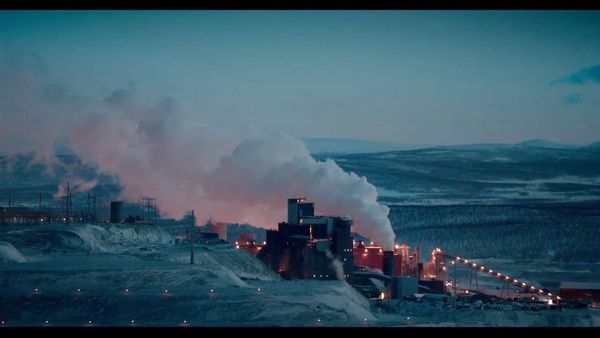 |
| Mining town Kiruna in Northern Sweden: "There were some mining poems, old ones, about seeing the lights and being in the shadow." Photo: Anne-Katrin Titze |
Broken Hill Blues (Ömheten) director Sofia Norlin and I arranged to meet at the Tribeca Film Festival press lounge to have a follow up conversation after her Tribeca Talks: Pen to Paper - Calling the Shots panel appearance. We spoke about working with light, a small crew, meeting editor Thelma Schoonmaker, Aki Kaurismäki's pastel colors, workers' lyricism, gender, nature and DH Lawrence.
Broken Hill Blues is a filmic ballad of a northern Swedish mining town that is in danger of collapsing into the earth. Norlin explores the worlds above and sometimes below ground of adults, teenagers, and children who go about their daily lives and encounter love, wilderness, anger, and themselves among the ferns or driving an old car.
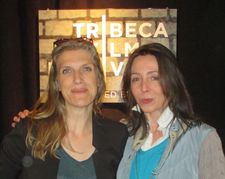 |
| Broken Hill Blues' director Sofia Norlin with Anne-Katrin Titze: "When we shot the images in the end in the mountains it was 2:30 in the morning." Photo: Anne-Katrin Titze |
Anne-Katrin Titze: Are you enjoying the festival or is New York too exciting?
Sofia Norlin: I haven't seen any films. I have been meeting people. It was a dream. I met Thelma Schoonmaker, Martin Scorsese's editor. I've always wanted to meet her and she held a masterclass. So inspiring - I was so happy to be there.
AKT: Did she also talk about Michael Powell?
SN: She showed some Powell editing. She is such a rock n' roll lady - white hair, black clothes!
AKT: Light and darkness play a great role. At one point you have a radio announcement saying sunrise is at 11:00 and sunset is at 3:00. Can you tell me a bit about the light in your film?
SN: Yes. In the middle of the Winter, there is night all the time. There is no light. So when we shot in March, the light was back. Even though we did the location research, we did most of it in February and it was minus 31 degrees [Celsius] and it was dark nearly all the time. The day is really short and people are mostly inside in very confined spaces. I tried to tell that in the film. And then, when the light comes back, summer is like 24 hours a day.
When we shot the images in the end in the mountains it was 2:30 in the morning. And that gives very special light. You can see that in Scandinavian films, for example Aki Kaurismäki. The light goes down in the stratosphere at a place where it shines through many pastel colors. That makes it very orange or pink or turquoise. Then it went away but it only went ten minutes behind a mountain top and came back. That was the night. The light was there all the time. I worked with a small crew. We were only five persons and we would shoot at whatever time.
AKT: You are from Northern Sweden, so you know the landscape well. The children going through the forest, exploring it, that felt very personal.
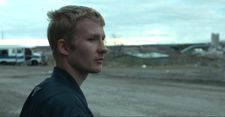 |
| Sebastian Hiort af Ornäs as Markus: "I decided to show society as it is but I hope in a sensitive way." |
SN: Yes! Those are my children! I am not from this town Kiruna but not far from there.
AKT: Was this also your childhood memory? The children playing in the woods?
SN: Yes. Both. The children going through the forest, I did this as a kid. I was the big girl going with my brother who is younger and other kids, mostly boys and we were out in the forest. It's very personal. Now the boy in the film is my son and the younger girl is my daughter. And I had my third baby in the belly. I was very pregnant during the filming. I was so pregnant up in the mountain. We had so much fun with the small crew. I realised, this is also how we work, we go around in the forest - we have the camera but we are doing exactly the same thing as the children!
AKT: The adolescents who live in the less rural part seem much more trapped in their apartments.
SN: That was very important, to have a contrast. The imprisonment and then this tremendously huge landscape. When the kids are walking in the Fougère, the high ferns - this was there before the ice age. The valley was steep so the ice couldn't touch it. This vegetation is very very old.
AKT: Pre-Ice Age vegetation and little kids! Past and future of the world meet.
SN: There's something else with those kids. They are the future, they are at risk, because I'm worried about the future generations, what we leave behind. [In a scene in the film] they go to the iron garbage dump. We took out the iron from the mountain and we made these things or we crushed it for weapons that are also made of iron, which is also in the film. And then we leave those mountains of iron garbage and the children walk through them. And this is my son walking through and I think, this is what we leave behind for you.
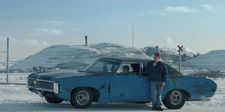 |
| Sofia Norlin's Broken Hill Blues: "I'm worried about the future generations, what we leave behind." |
AKT: A collapsing world. This is where the cracks underneath the town that are actually there become so much more than symbolism.
SN: Yeah. The party is over, in a way.
AKT: This is quite a coincidence. In the conversation I had with director Paolo Virzi about his movie Human Capital (Il Capitale Umano) a few days ago, he said the same line. The party's over. This could become the running gag at the 2014 Tribeca Film Festival - everyone is telling me the party is over! Tell me about the scenes with the father (Pär Andersson) who tells his son Daniel (Alfred Juntti) that he won't drink anymore before they enter a boxing match, one glove each. Later we see him passed out with his buddies and empty bottles all over the table.
SN: I think we all know this kind of person in our family or in ourself. In ourself too, because we want to try to make things good and we cannot always do that. Here it is the question of love and I believe they love each other, and that violence he leaves behind. It's also the violence the father lives, maybe in the mine. With what life is doing to him, he cannot give more than what remains on this table.
AKT: Another very strong scene is when the same boy shoots the reindeer. Why did you include this? We speak about poetry, but it is a violent film you've made.
SN: It is violent, and it's political violence. I think I say it is a very beautiful world but it is very violent. The film is also about something very destructive, dividing community, dividing family members. It was important for me that Daniel, a young man from modern society disconnected from nature - we are as human beings very vulnerable in nature - that he goes out alone into nature and thinks he can manage.
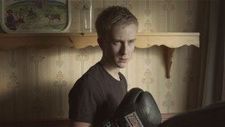 |
| Alfred Juntti as Daniel: "A young man from modern society disconnected from nature - that he goes out alone into nature and thinks he can manage." |
AKT: In his undershirt and with a gun.
SN: A gun! Which is such an old dream! The dream of surviving like the first people up there, the Swedish colonisers. And he can't handle that. He meets nature on his bare skin. There's also an ecological dimension in the film. That we are not in harmony, we have to rethink for a sustainable future for generations to come.
AKT: I felt a link between how you were filming the reindeer and the girl's hair and skin earlier on in the film. The skin is filmed in a very tender way.
SN: That's Petrus [Sjövik], the DP. We searched for the images together but he is such a sensitive person and so good with light.
AKT: Did you link the girl and the animal?
SN: I didn't think about it that way. But I did this kind of shot reverse shot between Daniel and the reindeer. I mean, they meet each other just as much as a character. Even politically, that's important. We are depending on nature but we are also together with it. Usually you don't take the reindeer's point of view.
AKT: Especially a dying reindeer. Let's talk about gender. You show the girls fixing their make-up and hair and the boys going ice fishing. Is this what you found in the town?
SN: I'm from a place like this, a small village and this is how people live. I;m not saying that there aren't girls doing other stuff. I was a girl doing other stuff. I'm very concerned about gender questions. Especially how to film women, girls. But also how to film men. I can see myself in Markus (Sebastian Hiort af Ornäs) and Helena (Jenny Sandberg}, I am all of them in a way.
I decided to show society as it is but I hope in a sensitive way. Helena is also a subject - we see things with her eyes. She is very present and a strong character. As I am talking about a society that is shaking and dying, I couldn't talk about what I wanted to see in the future.
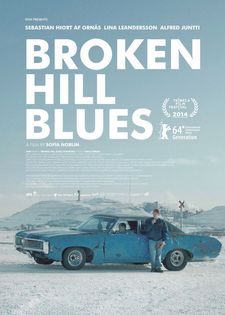 |
| Ömheten (Broken Hill Blues) poster |
AKT: I like that you didn't force something onto it.
SN: It's something that I talk about with my director friends, mostly women. Should we show what we want to see in society? Non-traditional things we would like to see in the future? Or should we, trying to speak about society, develop the characters on what we have now? It's a big question. When it comes to showing sensuality, then it's more complex too. In my film, she is not an object. She has this very traditional character of hairdresser and doing girl things.
AKT: It is an important decision about role models. You do have the strong little girl, the leader of the pack. Now I know this is you…
SN: It is very much me.
AKT: I mentioned to you yesterday after the Calling the Shots panel that your film reminded me of a short story and I couldn't remember what it was. You brought up DH Lawrence and Lady Chatterley's Lover to me. Well, I did find my reference. It was a story by Swiss author Urs Widmer, who died two weeks ago. It is called The Salt Of Wieliczka and is about a town in Poland near Krakow that is built on top of an enormous salt mine. The caves are as big as a cathedral, in fact they built a cathedral.
SN: Like a cathedral underground? That's a very poetic image.
AKT: Yes. The story is about the escape of the horses working underground in 1812. People were saying they saw the horses escape, run through the town and lift up into the air straight to heaven. This story I read years ago came back to me while watching your film. The town Kiruna in Northern Sweden where Broken Hill Blues takes place is threatened to collapse into the mine below it. Underneath the very real struggles your film is also very poetic. How did the poetry come in?
SN: I read a lot of poetry. I tried to read workers' lyricism and also on mining because I thought this film would be like workers' poetry. I never said that before. There is that poetry where people are writing about work. There were some mining poems, old ones, about seeing the lights and being in the shadow. Yeah, I was trying to do a work of poetry in my film.
AKT: Another scene I liked very much is when the guy builds a tower out of furniture to climb up to her window. It looks so precarious.
SN: It was and he fell. He wanted to do this on his own and it was 1:30 in the night. It seems like daylight but it's not. He brings her flowers. The gestures of love and tenderness are so important. That's where the DH Lawrence comes in. This is what we have. Paradise on Earth, in a way. The party's over but there's paradise on Earth.
Tribeca Film Festival remaining public screenings: Wednesday, April 23, 4:30pm - Bow Tie Cinemas Chelsea 9; April 26, 8:30pm - AMC Loews Village 7 – 3





















